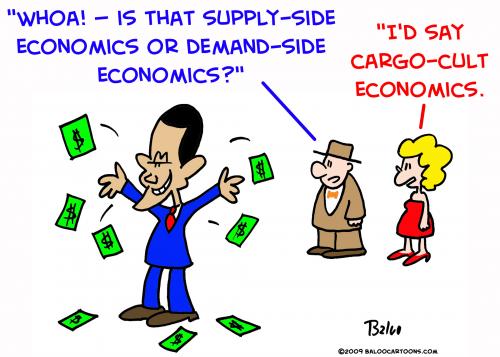| Back to the Future: Pacific Island's Cargo Cult Mentality is Alive and Well in Appalachia |
 |

By John Freivalds
My late wife's' father was an Air Force pilot in World War II some 70 years ago. In flying to various remote South Pacific islands he noticed some strange habits of the primitive natives living in the jungle. They had a subsistence lifestyle with little change and suddenly they saw hundreds of planes landing in their jungle and disgorging goodies they had never seen before. They wanted some as well and hacked crude landing strips out of the jungle hoping planes will see the strips, land and off load goodies. Urban westerners would laugh at this but upon reflection are we no different from the "cargo cults."
Now Appalachian politicians are seeking votes in 2018 and will offer to unload: cargo containing roads, even more roads, hi-tech buildings, historic buildings, bridges, pedestrian malls, cobblestone streets, pilot projects, museums, stadiums, light rail, fast rail, slow rail, train stations, advanced and remedial retraining and still more training for out of work coal miners, and the latest flavor of broad band installations everywhere.
Alas most of the modern cargo cult structures and roads end up as boondoggles and aren't connected to anything else going on. Senator Robert Byrd of West Virginia often slipped these projects into the Federal budget. West Virginia became known as "earmarks heaven." I dare you to drive around the state and try to find something that isn't named after Byrd.
Ok what's a boondoggle? Webster's says "a wasteful or impractical project often involving graft." And we always seem to find more boondoggles in the poorest parts of the country. We have all read why Appalachian coal is no longer as valuable as it once was, but there are politicos stating that introducing broadband telecommunication in distressed communities is the way out of poverty. Even President Trump, in his recent speech to the Farm Bureau, touted broad band as the key to reviving rural America.
My favorite touchstone for all is is the "Hi-Technology Center" at 301 Summers Street in Hinton, West Virginia, sixty miles from Roanoke. It was to be part of the federally funded "technology corridor" running along I-64 from Beckley to Lewiston. The Hinton Hi-Technology Center built in 2005 had 42,000 square feet of office space with broadband, internet, charging stations for electric cars and special electric wiring.
The purpose of these cargo offloads is to attract hi-tech entrepreneurs and retrain coal miners in a region hard hit by coal's decline. Former Mayor of New York Michael Bloomberg disparaged the comments made by the founder of Facebook: "You can teach people to code and everything will be alright." But, Bloomberg said, "Coal miners can't become coders." Or as my farmer neighbor in Lexington said "can't make dogs cats."
Then the Fed and local entrepreneurs started pushing community broadband networks as a means to lift Appalachia. The former EPA administrator extolled a program throughout Appalachia called "Cool and Connected."
And in Southwestern Virginia local communities in Bristol and Dickenson County put up hundred of millions of dollars only to have fraud and mismanagement devour the monies. Richard Bailey, writing in Reason Magazine, has visited Central Appalachia to examine all the broadband efforts and made this headline: "The noble misguided plan to turn coal miners into coders -- extensive high-speed internet and job training will not transform Appalachia into Silicon Holler."
Whatever is done needs to be connnecetd to something real and done in an integrated fashion. The interstate highway system works because all the parts are connected and are done regionally. This is why the Tennessee Valley Authority (TVA) worked in Appalachia. Ok I am prejudiced for I worked for David Lilienthal the first chairman of the TVA and went around the world building TVA type projects. Could these types of projects be done with all the talk about infrastructure? Presidents Roosevelt and Eisenhower made these big projects happen but we don't have that kind of leadership now.
Oh yeah, before I forget, whatever happened to the Hi-Technology Center in Hinton? It's now a day care center.
